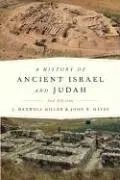

A History of Ancient Israel and Judah, Second Edition
Pages
552
Publisher
Westminster John Knox
Published
10/1/2006
ISBN-13
9780664223588
This classic textbook, widely used for over two decades, constructs a history of ancient Israel and Judah through a thorough investigation of epigraphical, archaeological, and biblical sources. Approaching biblical history as history, Miller and Hayes examine the political and economic factors that give context to the Israelite monarchy’s actions and the biblical writers’ accounts. Now updated with the latest research and critical discoveries, including the Tell Dan Inscription, and considering the lively debate surrounding the reliability of biblical accounts, Miller and Hayes’s judicious and evenhanded portrayal gives detailed attention to the nature, strengths, and limitations of various forms of evidence for understanding Israel’s origins and early history. The new edition also includes thirty-four new maps, helpful notes, and numerous charts and photographs.
Reviews
An updating of a classic critical study.
[Full Review]
Louisville, Ky.: Westminster John Knox, 2006. Pp. xxii + 562. Paperback. $39.95. ISBN 0664223583. Kenton Sparks Eastern University St. Davids, PA 19087 In his review of the first edition of Miller and Hayes, Philip Davies wrote: “The basic question appears to be whether this book marks the end of the road for the genre of biblical history. My answer, with many others, is yes, and herein lies not so much a weakness but a strength of the Miller and Hayes volume. It is unlikely that this particular kind of history can be written much better” (JSOT 39 [1987]: 4). With these words, I take Davies to mean that Miller and Hayes had written a history of Israel that was on the verge of breaking free from the Bible’s grip, but which did not finally do so. For Davies and for those of his ilk, a fully appropriate history of Israel would realize that the Hebrew narratives are essentially works of late fiction, which can hardly provide the grist for modern historical mills. If this is really the kind of history that Davies and the minimalists want, then this new edition of Miller and Hayes is no better than the last one. In fact, if there is theoretical movement at all in the historiography of these authors, it would be a modest step in the direction of biblical history. By this I do not mean “biblical history” as incarnated in a conservative work like A Biblical History of Israel (by Provan, Long, and Longman; Westminster John Knox, 2003), which often amounts to a thoughtful but semi-critical paraphrase of the biblical narrative. Rather, the history of Miller and Hayes is “biblical” in the sense that these authors believe that the biblical histories, upon critical evaluation, can provide a useful window into the events narrated in them.
[Full Review]

